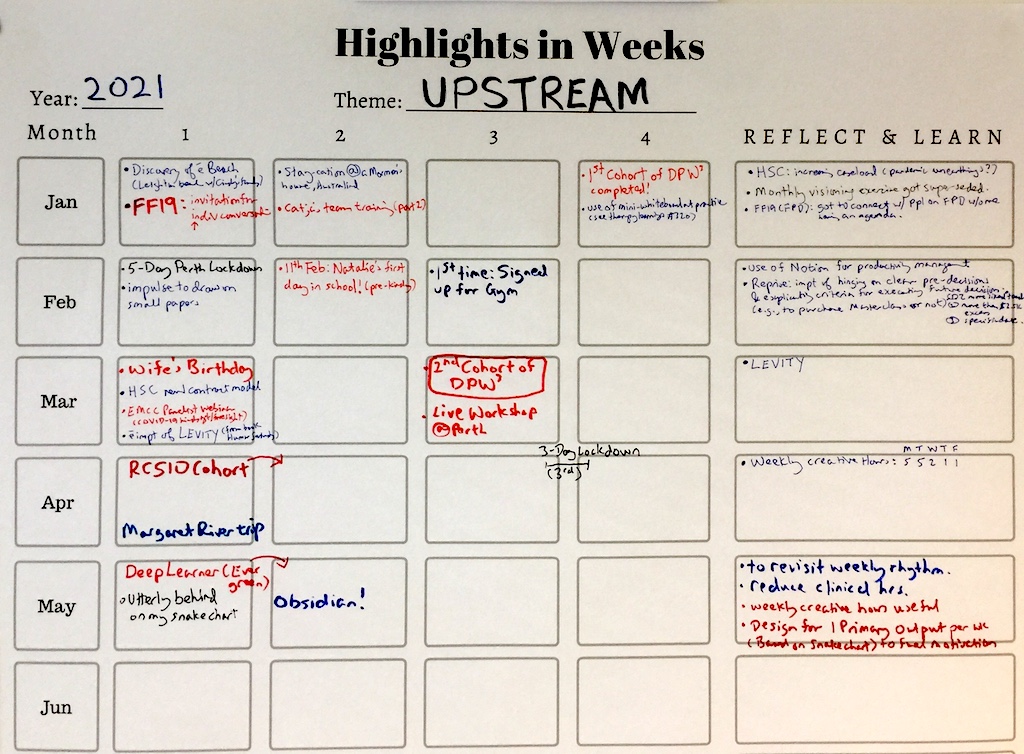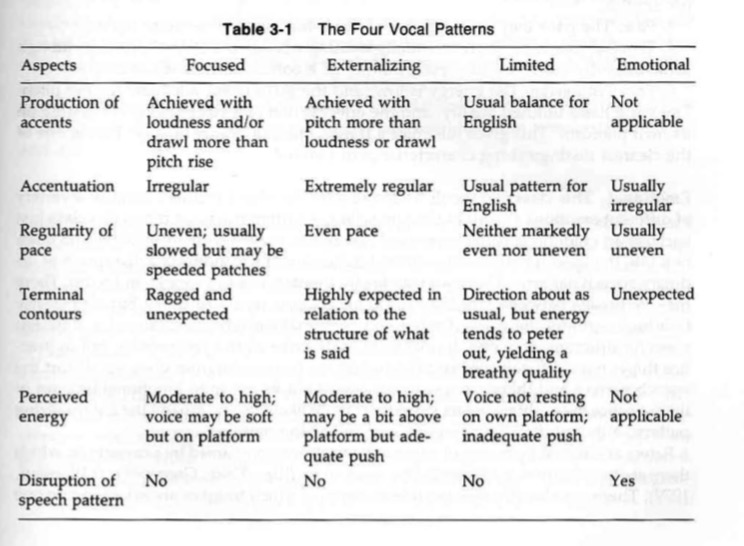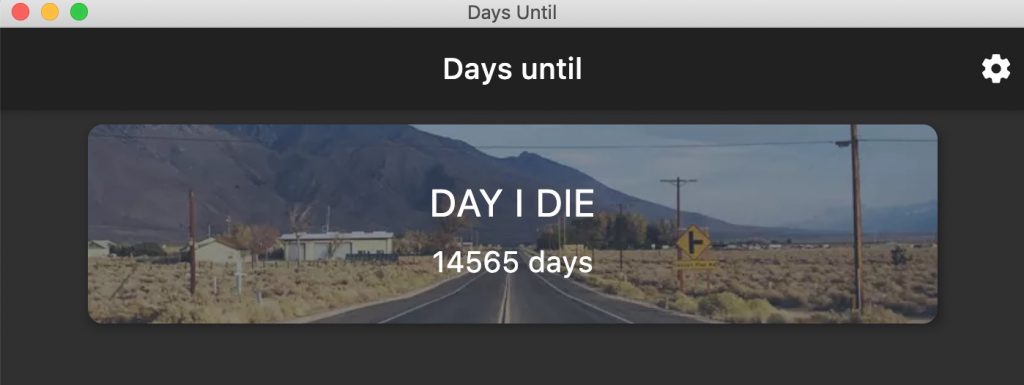What’s essential is invisible to the eye.
~ Antoine de Saint-Exupery, The Little Prince.
This is long overdue.
It’s end of April 2021, and I’m only beginning to be able to look back at the past year. I don’t know about you, but the first few months of 2021 moved pass me at the speed of light.
Clearly, 2020 is going down in history of the year of the pandemic.
(Note: This post isn’t about the experience of the pandemic. Feel free to listen to this webinar where a couple of us were invited to speak on what we can learn from the COVID-19 experience ).
For those who are familiar with the Frontiers of Psychotherapist Development (FPD), I do an annual evaluation to see where I’ve been, so that I can get a sense of where I’m going.
Here’s the previous year’s reflections:
2018
Private Thoughts (Part I)
Personal Learnings (Part II)
2019
Personal Mistakes (Part I)
Personal Learnings (Part II)
I’ve been using a template called Highlights in Weeks to document the main takeaways each week of the year.
If you are interested in using the template, I’ve made a revised version of this, and you can download it for free. (note: I’ve printed it out as A2 size, so that it’s feasible to write on).
Here’s a snapshot of mine for 2020.

And here are my 6 key “Reflect and Learn” (see bottom of the image “Reflect & Learn”):
1. WWMM

When I looked back at 2020 and my previous 2 years of “highlights in weeks,” I realised that a good day often constitute these four parts:
i. Wake
ii. Write
iii. Move
iv. Music
i. Wake
Not that I have the luxury to sleep in, but when I wake up and what I do seems to have a correlate to how I experience the day.
If I wake up after hitting too many snoozes on the alarm, it usually means that I don’t get to start the day on a good note. (mostly it’s getting the kids up and ready for school).
Given my temperament and the way I work, I am now accepting the fact that I have to wake up before everyone else does.
This gives me the opportunity to be in a spacey reflective mindset as the day breaks, do some stretches (I have developed a lower back issue), and write (see the next point).
ii. Write
It has become obvious to me over the years that the highest level I can get in my work, not only in reaching out to others through the blogs in Frontiers and Fullcircles (for the general public), but writing really helps me sort out the mess in my head. (See point #10 in 2018’s reflection)
Most of the time, I really like the feeling of having written, but not the writing. Admittedly, this has gotten less painful over the years. I persist because the rewards of going through the process of writing has such as huge payoff for me, in terms of sharing ideas, but also sharpening my thinking. I am sure a messy non-linear thinker, and starring at the “cursor” cursing at me on a blank page (must be a reason why it’s called “cursor”), and letter by letter, word by word, paragraph by paragraph helping to take shape the ideas into something beyond what my head can hold all at once.
(Sidenote: This is why I rarely start writing from a blank page. My note-taking habits have had a huge pay-off through the years. I talk more about this in the course Deep Learner)
Writing has been so important to me that this is the only thing I track using a shockingly powerful app called Beeminder to help me stay on-track with my intentions to writing daily.

Essentially, the app is free. But based on a commitment that I make from the outset, if I fall off-track with my writing goals, I get “stung” by Beeminder and I pay $5 to them. I’ve been doing this since July 2020 and I’ve slipped twice. I know, it’s irrational, but paying $5 is really different from losing $5. (I dived more about the use of a Kahneman’s notion of “fear of a lose adversion” in the Deep Learner course).
iii. Move
I never though I would have done this in a million years, but I bit the bullet and since the 3rd week of Feb this year, I’ve succumbed to the self-torture of joining a gym.
Many of you wouldn’t see joining a gym as a form of self-inflicted pain, but I do. I am not a gym kinda guy. I caved in only because the gym that’s 5mins away from me has a pool.
Here’s my plan:
- I will continue to pay my weekly membership so long as I go at least once a week, and
- If I bail out a maximum of 3 times by 1st of June 2021, I will cancel my dues.
As you can tell, the fail of loss aversion is a fundamental principle that I’m trying to wield to my advantage.
I’ve only recently learned about making “pre-decisions” to help me avoid make small decisions as I go. This provides a sort of clarity and even commitment to my intentions.
iv. Music
Music has been so intimately woven into the fabric of my life, and it’s rather absurd that I don’t park time to play more music.
That said, it’s been 4 months in 2021, and I’ve yet managed to weave this into the daily mix as regularly as I would have preferred. Why is this so hard to make time for the very thing I love?
One thing I’m going to do is make all my instruments all plugged in and ready to go, whenever I get a 10-15mins break to pick it up and play.
Going forward, my aim is to have a certain kind of rhythm that permits a daily cycle of WWMM. Note to self: Good days are created by good moments.[1]
2. Repeated Mistakes
See General Mistakes in 2019, Point D. Unable to consistently wake up in the mornings to write.
It’s hard to avoid repeated mistakes when it’s in plain sight. Tracking my life this way–not in a pedantic way, but a thematic approach using this format of Highlight in Weeks, parallel with my calendar app–helps me see patterns, even those that I’m not so proud of.
Here are 3 of my repeated blunders:
i. Sleep late
Initially, I was going to say it was not being able to way up early, but for obvious reasons, it seems likely due to the fact that I get to sleep too late e.g., 11pm to 12am.
I seem to need more sleep than 2 years ago, if I’m aiming to wake up by 530am, I should get to bed by 1030pm the latest.
I’m returning to using an alarm in the night (set at 10pm to give me lead time). It seems so easy to keep going especially after putting my kids to sleep.
ii. Irregular exercise:
(See my entry above on “Move”. I’m keeping on track as of this writing!)
iii. Not adequately outsourcing “repeatable” work to assistant:
I have administrative help at my private practice, and I have a virtual assistant, but for whatever reason, I struggled to outsource most of my administrative and repeatable tasks.
So a couple of weeks ago, I set up various Trello cards to list down all the stuff that are repeatable actions that I can get her to help me more with. Let’s see if I can delegate better this year… Or better yet, cut down tasks!
3. Year by Theme
This idea of naming each year by theme was stolen from basketball coach Phil Jackson when he was working with the Chicago Bulls (see the documentary, The Last Dance, which was the theme he gave the team in their final season).
Last year’s theme for me was “Raising the Stakes.” My intention to increase my steps out of my comfort zone, like doing a podcast, etc.

As you can see in the screenshot of my current Highlight in Weeks, 2021’s theme is “Upstream.” My intention this year is focus less on downstream “fighter-fighting” type of activity, and more or working things that have higher impact, with my eyes cast on longer-term yield. Three books that really inspired me with these ideas are a Mary Oliver’s collected essays on Upstream, Upstream by Dan Heath and The Good Ancestors by Roman Krznaric. (I’d be reviewing Top 10 books in various categories in the Frontiers Podcast. Stay tuned!)
For instance, I’m considering investing more time in writing projects and running retreats/workshops for practitioners (as with most people, I prefer live/face-to-face contact when the pandemic relents).
4. Deep Connection is Possible Even in the Virtual Space
Like most therapists, it wasn’t my preferred choice to be in the virtual space. Even though I’ve been conducting consulting online for the past few years pre-covid, compared to face to face contact, video conference lacked the visercal quality inherent in live dynamic interactions.
That said, deep connection is still possible. In Novemeber last year for instance, while running a 4-day intensive workshop online (I know, this is highly demanding even for a live workshop), I felt a deep and moving connection with the group. Heartfelt stories were shared, and tears experienced in spite of the physics distance.
Among other pedagogical factors, my suspicion is that one of the factors that we don’t really take care of is the quality of the sound, specifically vocal quality.
Michael Kraus and colleagues have shown that while we have a preference for both video and audio inputs for communication, it turns out that when we have only voice input–that is minus non-verbal input–our emotional accuracy is just as accurate.[2]
Based on the 5 experiments that were conducted, contrary to earlier Paul Ekman’s work on the reliance of facial cues, Kraus added,
The current research suggests that relying on a combination of vocal and facial cues, or solely facial cues, may not be the best strategy for accurate emotion recognition—particularly because facial expressions can sometimes be inconsistent with internal states or used to actively dissemble.
(p. 652, Kraus, 2017)
It seems that alot emotional signal is conveyed in our voice. Psychotherapy researchers seemed to be clued into this early on in the 80’s when they attempted to codify vocal quality. Take for example, in Greenberg and Pinsof’s 1986 seminal edited book, The Therapeutic Process, Laura Rice and Gillian Kerr addressed the topic of measuring client and therapist vocal quality as indicators of the depth of processing within therapeutic conversations.

If you conduct trainings or meetings online, the implication is clear. Take care of the quality of your microphone input. Invest in a usb microphone. While a microphone headset does a good enough job, the microphone quality is highly compressed, which means that it would sound thinner that a proper condenser microphone.
If you are conduct therapy online, besides having a good mic, make sure that your speakers are clear. Don’t rely on the tiny sound coming out of your mobile device or laptop speakers. Get a headset or external speakers. That way, you get to intimately listen to your client’s cadence, prosody and tone reflected in their voice.
5. Frontiers Friday Weekly Newsletters
Over the years, I have been sending out newsletters inconsistently.
About 8 months ago, I made a commitment to send shorter but consistent weekly newsletters, which comes in the form of 5 key takeaways/recommendations etc. I took this idea from other newsletters that I’ve really enjoyed like Tim Ferriss and Austin Kleon, etc.
I have been pleased with the feedback that I’ve been getting from people like you (perhaps a self-selection bias). Many liked the suggested books and podcasts. Some mused about being overwhelmed with too many nuggets to keep up.
One thing I’ve been doing is instead of random sharing, I decided when I reformatted the newsletters to become “Frontiers Friday” was to organise the missives by themes. The first theme kicked off with a series on “Devotion to the Craft“
Personally, I’m glad I’ve done so. This keeps me structured, but also gives people a diverse smorgasbord to whet their appetite.
To see the past Frontiers Friday, see some samples here:
Frontiers Friday 26-28
Part I of Caring for People in Organisations
Part II of Caring for People in Organisations
Part III of Caring for People in Organisations
Frontiers Friday 30-32
Part I Clinical Supervision Latest Findings
Part II Clinical Supervision Matters
Parti III Clinical Supervision: Coaching Practices
Frontiers Friday 33-36
Part I Feedback Informed Treatment (FIT)
Part II Feedback Informed Treatment (FIT)
Part III Feedback Informed Treatment (FIT)
Part IV Feedback Informed Treatment (FIT)
If you haven’t already, feel free to subscribe to our short and stout, weekly Frontiers Friday Newsletter.
6. Perspective of Time
Kevin Kelly is a sort of unlikely intellectual hero for me. I first came across his work in his book, The Inevitable, which cover grounds on innovations in technology.
He wrote a blog called My Life Countdown that got me to think about this idea on changing my perspective of time.
In gist, I installed an app that did only single thing: It’s a countdown timer.
But my sole purpose is to countdown one event. The day I die.
Here is a screenshot of an app that he recommended to download that sent a livewire down my spine:

Note: pick a free app that works as a countdown timer. I install Days Until app for Mac. Seet it to count only this one variable: The day you die.
Based on some simple Web search, and being an Asian male who doesn’t have significant bad habits or heath issues, I estimated how long I might live (about 81.4 years), and then key in the rough date, and viola. The day I die.
What was striking was how little amount of days I mighty likely have (14,000+). At age 42, for some unexamined reasons, I assumed I would have abit more days than that!
This completely heighten my sense of wakefulness about my mortality. It sharpened some kind of clarity in a visceral way… I mean, we all know that we are all gonna die, but have the estimates of the literal number of days left, completely added perspective.
I told some people about what I did with this countdown timer. One said “that sounds a bit morbid.” A youth I was working with said, “That sounds like alot of time left.” Talk about perspective… but most have the same reaction of “Wow.”
Most of the exclamations were really about the implications for themselves.
On a related note, as I think about people in my life who have passed away, I’ve been thinking a lot about what it means to die well. After all, how we die impacts the living. There’s an African proverb that I hold close, “When death finds you, may it find you alive.”
Books that I’ve liked on the topic of death and grief:
– Diewise by Stephen Jenkinson (His documentary Grief Walker is a good one too)
– Being Mortal by Atul Gawande
– Remembering Lives by Lorraine Hedtke and John Winslade
Going Forward
Based on the first months of 2021, I can speculate what might be my 2022 learnings. One thing I’m reminding myself is not to only focus on the most recent events (a form of recency bias), but to take stock of the perennial learnings and mistakes that keep coming up over the years.
My hopes for sharing this is that you would also consider taking care of your time. If the Highlight in Weeks format suits you, you can download the template here for free.
Footnotes:
[1] Clearly this does not exclude living and spending time with my family and going to work. It seems to me that if I get the pillars of WWMM in place, I’m more likely to be of value to my family and my clinical practice and coaching/supervision/training work.
[2] Click here to read the 5 experiments from Michael Kraus’ study on “Voice-Only Communication Enhances Empathic Accuracy”, 2017.
Photo taken at Cape Leeuwin, Western Australia.
Note: Some of the book recommendations contains Amazon affiliate links. It’s free to read these blogposts, but not cheap to maintain. These pennies from the links are to help defray the costs.



Thank you for this yearly review! I get so much out of the tips and tools you share. Looking forward to even more. 🙂
Thanks. My hope is to make new mistakes.
The countdown timer is fantastic, Daryl. It jolts you awake!
I am reminded about a apocryphal tale in the Indian epic, Mahabharata, where a genie asks the wise Yudhishthir: “What surprises you most about human beings?”. And Yudhishthir replies” The strangest thing about humans is that they live as if they will never die, and they die as if they have never lived”
Love it! Didn’t know where the source of this was from. thanks for this.